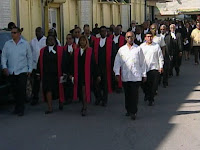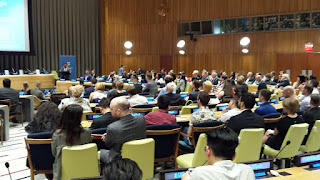State Policing Our Bodies: LGBT, constitution and Belize Law
Post 12 January, 2016
Does this mean that a same sex married couple in another country, one Belizean and one Foreign should accept the dignity of their relationship be DE-legitmized and torn apart by the immigration law that bars homosexuals from entering the country. Even, as a matter of policy the Immigration Department does not pry into the private life of a person, the mere presence of the law, though helps to support systematic discrimination in practice.
Amazingly, when one looks at the Constitution at section 26 accepts applications to be registered citizens of Belize from any person who is married to a citizen of Belize, and, any person who has been resident continuously in Belize for five years. When we consider that the law treats common-law unions in the timeline of five years and when one looks at section 26 below which speaks to any person who is married to a citizens of Belize and when one looks at the ideals of our constitution, especially, section 16(3) and 134(1) it amplifies the notation that our subsidiary laws are have become inconsistent with our constitution and with each other. It challenges us to ask question about which State mechanism is monitoring or working to correct these inconsistencies.
When one adds reflection on the state attempt to police the bodies of is decision, one only need to look at section 53 of Belize's criminal code chapter 101 of the laws of Belize which speaks to the following:
When we add the discussion about creating options like safe abortion. Section[3] 127 of the Criminal Code provides for the medical termination of a pregnancy in saving the mother, it will cause injury to the mother physical or mental health. If it would cause suffering of the child base on mental and physically abnormalities. In that same section, if the baby his healthy and abortion is induced deliberately, it changes the tone of the law and that person would be guilty of an offense. The question here is, can a person simply have an abortion because of rape, incest,is too poor to care for another child? and who determines the emotional impact of caring for the child when the state does not provide sufficient options.
When one looks at access to HIV testing for young people and access to contraceptives, we see the requirement for parental consent in practice by state institutions, we see certain schools allowed to censor health information that could inform students better about their sexuality.
When we speak of sex workers, they can giveaway their body for free, but the benefiting from earnings and storing earnings in a bank is met with suspicion and resistance, however,monies earned by sex workers can be acceptable if they are domestic workers. Their right to work and economic selves reliance is met with suspicion at the bank, their right to work has no recognition and access to social security, is challenged by the non-traditional nature of their earning. Moreover, if a foreign sex worker has experienced rape or violence, but have an immigration problem, the law discourages a sex worker from getting justice in court, through deportation, the consequence, violence and discrimination ultimately follows her.
In discussing Belizean law and the constitution, one discovers that independent legal monitoring mechanism are non-existent. The onus is left on citizens to find the resources to correct laws that affect them, the state, of course will counter in the protection of the existing law. As evidence, we see the immigration law defense for Belize at the Caribbean Court of Justice and we see a defense put up against section 53. We see as well that the state has no clear roadmap in reducing the policing of its citizens bodies, for it has no monitoring body to provide guidance. The result is indifference towards correct the inconsistency in law, a practice that remains unchanged since 1981.
Source:
[1] Chapter 4 of the Laws of Belize, Revised Edition 2000, pp. 2-3.
We have never assessed Belizean law, what the constitution of Belize says about discrimination nor how current laws maybe inconsistent with the constitution. While the blog is about LGBT relationship security, it offers readers the opportunity to reflect about the implication of how the state tries to police the bodies of its citizens, in addition, legal penalties against citizens to comply with it's intent of securing public morality. An intent that is systematic, in denying women the right to use their bodies as they wish in sex work and in general reproductive decisions; denying young people information to prevent pregnancy and general sexually transmitted diseases; the legal protection to found a family as same sex couples do not have the option of registering their parental rights as a couple; choice over health decision and forcing same sex couples to incur extra cost- in terms of acquiring power of attorney and making wills when succession of estates do not acknowledge the basic dignity of same sex couples common-law unions in the administration of estates.
The Constitution
affirms in its preamble that Belize is founded upon the Supremacy of God, faith
in human rights and fundamental freedoms, the dignity of the human person, and
the equal and inalienable rights of all members of the human family.[1]
The Preamble reads as follows:
Whereas
the people of Belize (a) affirm that the Nation of Belize shall be founded upon
principles which acknowledge ... faith in human rights and fundamental
freedoms, ... the dignity of the human person and the equal and inalienable
rights with which all members of the human family are endowed by their Creator;
... (e) require policies of state ... which eliminate economic and social
privilege and disparity among the citizens of Belize whether by race,
ethnicity, colour, creed, disability or sex; which ensures gender equality;
which protect the rights of the individual to life, liberty, basic education,
basic health, the right to vote in elections, the right to work and the pursuit
of happiness; which protect the identity, dignity and social and cultural values
of Belizeans, including Belize’s indigenous peoples; ... the establishment of a just and equitable
international economic and social order in the world with respect for
international law and treaty obligations in the dealings among nations[.]
In addition, section 16 of the Constitution further underscores the
law’s commitment to anti-discrimination in law and practice. The Section provides:-
(1)
Subject to the provisions of subsections (4), (5) and (7) of this section, no
law shall make any provision that is discriminatory either of itself or in its
effect.
(2)
Subject to the provisions of subsections (6), (7) and (8) of this section, no
person shall be treated in a discriminatory manner by any person or authority.
(3) In
this section, the expression “discriminatory” means affording different
treatment to different persons attributable wholly or mainly to their
respective descriptions by sex, race, place of origin, political opinions,
colour or creed whereby persons of one such description are subjected to
disabilities or restrictions to which persons of another such description are
not made subject or are accorded privileges or advantages which are not
accorded to persons of another such description.
Furthermore, section 6 of the
Constitution also recognizes the equal protection of all citizens before the law.
The Section reads:-
“All persons are equal before the law and
are entitled without any discrimination to the equal protection of the law.”
We know as well that section 3 speaks to a categories of rights in which framers acknowledges the diversity of the environment under which Belizeans live. Section 3 speaks to the following:
Whereas every person in Belize is entitled to the fundamental rights and freedoms of the individual, that is to say, the right, whatever his race, place of origin, political opinions, colour, creed or sex, but subject to respect for the rights and freedoms of others and for the public interest, to each and all of the following, namely-
(a) life, liberty, security of the person, and the protection of the
law;
(b)freedom of conscience, of expression and of assembly and
association;
(c) protection for his family life, his personal privacy, the privacy
of his home and other property and recognition of his human
dignity; and
(a) life, liberty, security of the person, and the protection of the
law;
(b)freedom of conscience, of expression and of assembly and
association;
(c) protection for his family life, his personal privacy, the privacy
of his home and other property and recognition of his human
dignity; and
(d)protection from arbitrary deprivation of property
We know that fundamental rights in the constitution applies to all because no where in the preamble does i speak to except L.G.B.T person. When we look at the ruling of Toonen vs Australia, we see sex extends to or is inclusive of sexual orientation. Of note, we see that in 2001 the preamble was modified to speak to gender equality which implies implies an even
more expansive interpretation of the protection; arguably one that extends
beyond biological sex identification of males and females to include sexual
minorities.
Ideals of the constitution, however, do not match the indent of the constitution in subsidiary laws. In a way subsidiary laws operationalise the constitution, but in a vacuum where political and legal engagement is absent on LGBT issues and more broadly on a person right to bodily integrity, the lack of systematic monitoring and institutional research have created a system of penalisation, cultivated a system of exclusion that have affected countless generation.
When we look at our Administration of Estate Act, it seems to counter to the ideals of the very constitution, "no
person shall be treated in a discriminatory manner by any person or authority," for The Administration of Estate Act, speaks to a wife and husband, but does not acknowledge other person in consensual common-law relationship and their place in the governance of succession.
The Administration of Estate Act, Cap 197
of the Laws of Belize, RE 2000-2003, § 54 (1) speaks to the residuary estate of an
intestate shall be distributed in the manner mentioned in this section, namely-
(a)
if the intestate leaves a wife
or husband, with or without issue, the surviving wife or husband shall take the
personal chattels absolutely, and the residuary estate of the intestate, other
than the personal chattels, shall stand charged with the payment of a net sum
of six hundred dollars free of costs to the surviving wife or husband....
This differential treatment is further enhanced or clouded by the Supreme Court, Judicature Act, Cap 91, Laws of Belize, RE 2000-2003 section 148:01 in its definition of a common-law relationship, speaks to"spouse," "himself" and word like,"a party" and "union" The Supreme Court of Judicature Act of 2003 section[2] 148:01 provides for common law relationships and defines “common law union” or 'union.' The section speaks to, "A party to a common law union shall have the same rights as
a spouse to a marriage, in respect of himself ..." but does not speak to defining spouse or reference any interpretation to surrogacy as part of that union in the birth of children or the existence of same sex relationship that have existed for 5 years or more. The lack of clarity opens itself for legal interpretation.
Section 5 of the Immigration Act
Chapter 156 of the Laws of Belize reads as follows:-
5.-(1) Subject to section 2 (3), the
following persons are prohibited immigrants-
(e) any
prostitute or homosexual or any person who may be living on or receiving or may
have been living on or receiving the proceeds of prostitution or homosexual
behaviour;
Does this mean that a same sex married couple in another country, one Belizean and one Foreign should accept the dignity of their relationship be DE-legitmized and torn apart by the immigration law that bars homosexuals from entering the country. Even, as a matter of policy the Immigration Department does not pry into the private life of a person, the mere presence of the law, though helps to support systematic discrimination in practice.
Amazingly, when one looks at the Constitution at section 26 accepts applications to be registered citizens of Belize from any person who is married to a citizen of Belize, and, any person who has been resident continuously in Belize for five years. When we consider that the law treats common-law unions in the timeline of five years and when one looks at section 26 below which speaks to any person who is married to a citizens of Belize and when one looks at the ideals of our constitution, especially, section 16(3) and 134(1) it amplifies the notation that our subsidiary laws are have become inconsistent with our constitution and with each other. It challenges us to ask question about which State mechanism is monitoring or working to correct these inconsistencies.
Section 26(1) speaks to
The following persons
may, upon making application at any time after Independence Day, be registered
as citizens of Belize –
(a)
any person who is married to a
citizen of Belize;
(b)
any person who has been
resident continuously in Belize for a period of five years immediately before
the date of his application.
When one adds reflection on the state attempt to police the bodies of is decision, one only need to look at section 53 of Belize's criminal code chapter 101 of the laws of Belize which speaks to the following:
Every person who has carnal intercourse against the
order of nature with any person or animal shall be liable to imprisonment for
ten years.
When we add the discussion about creating options like safe abortion. Section[3] 127 of the Criminal Code provides for the medical termination of a pregnancy in saving the mother, it will cause injury to the mother physical or mental health. If it would cause suffering of the child base on mental and physically abnormalities. In that same section, if the baby his healthy and abortion is induced deliberately, it changes the tone of the law and that person would be guilty of an offense. The question here is, can a person simply have an abortion because of rape, incest,is too poor to care for another child? and who determines the emotional impact of caring for the child when the state does not provide sufficient options.
When one looks at access to HIV testing for young people and access to contraceptives, we see the requirement for parental consent in practice by state institutions, we see certain schools allowed to censor health information that could inform students better about their sexuality.
When we speak of sex workers, they can giveaway their body for free, but the benefiting from earnings and storing earnings in a bank is met with suspicion and resistance, however,monies earned by sex workers can be acceptable if they are domestic workers. Their right to work and economic selves reliance is met with suspicion at the bank, their right to work has no recognition and access to social security, is challenged by the non-traditional nature of their earning. Moreover, if a foreign sex worker has experienced rape or violence, but have an immigration problem, the law discourages a sex worker from getting justice in court, through deportation, the consequence, violence and discrimination ultimately follows her.
In discussing Belizean law and the constitution, one discovers that independent legal monitoring mechanism are non-existent. The onus is left on citizens to find the resources to correct laws that affect them, the state, of course will counter in the protection of the existing law. As evidence, we see the immigration law defense for Belize at the Caribbean Court of Justice and we see a defense put up against section 53. We see as well that the state has no clear roadmap in reducing the policing of its citizens bodies, for it has no monitoring body to provide guidance. The result is indifference towards correct the inconsistency in law, a practice that remains unchanged since 1981.
Source:
[1] Chapter 4 of the Laws of Belize, Revised Edition 2000, pp. 2-3.
[2] Supreme Court of Judicature Act, Cap 91, Laws of Belize, RE
2000-2003, § 148I: A party to a common law union shall have the same rights as
a spouse to a marriage, in respect of himself or the children born out of the
union, if any, to apply to the courts,
either during the subsistence of the union or upon the separation of the
parties to the union, for maintenance, and any law nor or hereafter in force in
relation to maintenance in respect of spouses to a marriage shall, upon the
commencement of this section, apply, with the necessary modifications, to a
party to a common law union.
[3] Criminal Code, Op.
Cit., §112, 127: 112.-(1) A person shall be not guilty of an offence under the law
relating to abortion or miscarriage when a pregnancy is terminated by a
registered medical practitioner if two registered medical practitioners are of
the opinion, formed in good faith-
(a) that the continuance of the pregnancy would involve risk to the life
of the pregnant woman, or of injury to the physical or mental health of the
pregnant woman or any existing children of her family, greater than if the
pregnancy were terminated; (b) or that there is a substantial risk that if the
child were born it would suffer from such physical or mental abnormalities as
to be seriously handicapped. (2) In determining whether the continuance of a
pregnancy would involve such risk of injury to health as is mentioned in
subsection (1) (a) account may be taken of the pregnant woman's actual or reasonably
foreseeable environment.
§127.-(1) The
crime of causing abortion or miscarriage of a woman can be committed either
by that woman or by any other person, and that woman or any other person can be
guilty of using means with intent to commit that crime, although the woman be
not in fact pregnant.
(2) The crime of causing abortion can be committed by causing a woman
to be prematurely delivered of a child with intent unlawfully to cause or hasten
the death of the child.





Comments
Post a Comment